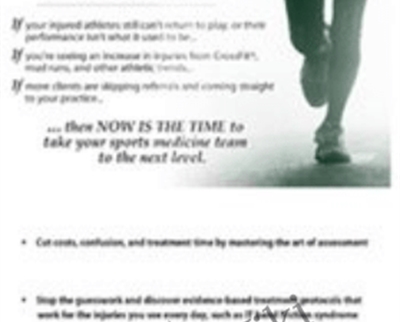Assessing & Treating Today’s Athletes: Get Faster Results with Evidence-based Protocols for the Injuries You See Most – Darrell Locket
$76.00
6 Hours 11 Minutes
Whether they're wrecking themselves in CrossFit® or football, record numbers of weekend warriors are cropping up with the sports injuries of professional athletes. That means business is booming for rehab professionals like you. However, with more athletes skipping physicians than ever before, you've got to be confident in your assessment skills if you hope to treat symptoms at their source.
Description
Purchase Assessing & Treating Today’s Athletes: Get Faster Results with Evidence-based Protocols for the Injuries You See Most – Darrell Locket Course at eBokly. We actively participate in group buys and are committed to sharing knowledge with a wider audience. What's more, our courses maintain the same quality as the original sale page. You have the option to buy directly from the sale page at the full price (sale page link is provided within the post).
Why Some Injured Athletes Never Return to Play—and What You Can Do About It
Whether they're wrecking themselves in CrossFit® or football, record numbers of weekend warriors are cropping up with the sports injuries of professional athletes. That means business is booming for rehab professionals like you. However, with more athletes skipping physicians than ever before, you've got to be confident in your assessment skills if you hope to treat symptoms at their source. If your caseload has stalled during this busy time with patients who aren't making much progress, now's the time to reevaluate your evaluations.
This hands-on program will take your sports medicine team to the next level, equipping you with evidence-based, multidisciplinary protocols for the athletic injuries you see most. From IT bands to impinged rotator cuffs, this course provides efficient clinical pathways for each member of your team, eliminating the guesswork from assessment, evaluation, treatment, and rehabilitation. With plenty of practice throughout the day, you'll quickly grasp the "why," "what," and "how" of common conditions like acute/chronic inflammation, microtrauma, neuromuscular imbalances, and joint instability. The effective interventions you'll try out in class will feel like second nature by the time you return to work.
Finally, explore the unique biomechanical demands of common sports and fitness activities and take home injury prevention methods and conditioning techniques that keep your clients doing what they love, whether they're swinging golf clubs or kettlebells.
- Analyze the anatomy, mechanics, and pathology of common sports injuries, reviewing differences in injuries seen in youth, adults, and other groups
- Compare assessment techniques for connective tissue injuries such as muscle, tendon, and ligament
- Identify orthopedic stress test techniques and methodologies for the upper and lower extremity
- Review evaluation techniques for abnormal biomechanics of gait and abnormal physiology of the kinetic chain
- Design preventive and reconditioning regimens that reduce the likelihood of injury for upper and lower extremity
- Integrate multidisciplinary clinical protocols for common sports injuries, covering assessment, evaluation, treatment, and rehabilitation
Sports Medicine Team Practitioner Approach to Treatment of Sports Injuries
- Treatment of the injury: Non-operative and operative (types of surgery)
- Healing phases and rehabilitation
- Lab: Comprehensive sports injury physical examination
- Lab: Gait, posture, and functional kinetic chain assessment
LAB: Physical Examination of the Ankle & Lower Leg
- Preventive measures, mechanics of injuries, inspection of gait, range of motion, manual muscle testing, and special stress tests
- Pes anserinus bursitis or tendonitis
- Shin splint or medial tibial stress syndrome
- Posterior tibial tendon dysfunction
- Achilles tear, strain, bursitis, tendonitis, or tenosynovitis
- Gastrocnemius and soleus strain
- Retrocalcaneal bursitis or Sever’s syndrome
- Lateral and medial ankle sprain
- Syndesmotic injuries (high ankle sprain)
- Tarsal tunnel
- Interdigital (Morton’s) neuroma
- Plantar fasciitis
- Peroneal tendon subluxation
- Jones fracture
- Stress fracture
- Avulsion fractures
LAB: Physical Examination of the Knee, Hip, & Thigh
- Preventive measures, inspection of gait, squats, lunges, range of motion, mechanics of injuries, palpation, and special stress tests
- Ligament injuries
- Anterior and posterior cruciate
- Medial and lateral collateral
- Cartilage injuries
- Meniscal tears
- Articular
- Degenerative joint disease
- Ligament injuries
- Patellafemoral injuries
- Chondromalacia
- Malalignment and instability
- Tendonitis or Osgood-Schlatter
- Degenerative joint disease
- Muscle injuries
- Gluteus maximus weakness
- Gluteus medius and minimus weakness
- Tensor fascia lata weakness
- Quadriceps femoris and hamstring strain/tendonitis/ruptures
- Hip injuries
- Hip impingement
- Trochanteric bursitis
- Adductor strain
- Iliotibial band friction syndrome
LAB: Physical Examination of the Shoulder & Arm Injuries
- Preventive measures, inspection posture, functional movement, mechanics of injuries, range of motion, palpation, and special stress tests
- Glenohumeral instability, anterior or posterior joint
- Rotator cuff strain, impingement or tendonitis
- Pectoralis strain
- Acromioclavicular joint sprain
- Brachial plexus (burner/stinger)
- SLAP lesion
- Bicipital tenosynovitis/subluxation
- Triceps and biceps strain
- Bursitis of elbow
- Lateral and medial epicondylitis of the elbow
LAB: Physical Examination of the Back Injuries
- Preventive measures, inspection gait, posture, functional kinetic chain assessment, mechanics of injuries, range of motion, palpation, and special stress tests
- Piriformis syndrome and sciatica
- Erector spinae muscle strain
- Sacroiliac sprain
- Acute and chronic low back pain
- Lumbar spinal stenosis
LAB: Physical Examination of the Wrist, & Hand Anatomy
- Preventive measures, inspection posture, mechanics of injuries, range of motion, palpation, and special stress tests
- Trifibrocartilage (TFC)
- DeQuervain’s
- Hand and fingers fracture/other conditions
- Gamekeeper’s thumb
Tag: Assessing & Treating Today’s Athletes: Get Faster Results with Evidence-based Protocols for the Injuries You See Most – Darrell Locket Review. Assessing & Treating Today’s Athletes: Get Faster Results with Evidence-based Protocols for the Injuries You See Most – Darrell Locket download. Assessing & Treating Today’s Athletes: Get Faster Results with Evidence-based Protocols for the Injuries You See Most – Darrell Locket discount.
Purchase the Assessing & Treating Today’s Athletes: Get Faster Results with Evidence-based Protocols for the Injuries You See Most – Darrell Locket course at the best price at eBokly. Upon completing your purchase, you will gain access to the downloads page. where you can conveniently retrieve all associated course files. Additionally, we will send you a download notification email to your registered mail.
Unlock your full potential with our Assessing & Treating Today’s Athletes: Get Faster Results with Evidence-based Protocols for the Injuries You See Most – Darrell Locket courses. Our courses are meticulously designed to empower you with the skills and knowledge needed for excellence.
Why wait? Take the first step towards greatness by acquiring our Assessing & Treating Today’s Athletes: Get Faster Results with Evidence-based Protocols for the Injuries You See Most – Darrell Locket courses today. We ensure a smooth and secure purchasing experience that guarantees your peace of mind. Rest assured that your financial information is safeguarded through our trusted payment gateways, Stripe and PayPal.
Stripe, renowned for its robust security measures, offers a secure and dependable payment process. Your sensitive data is encrypted using state-of-the-art technology, ensuring its confidentiality throughout the transaction.
PayPal, a globally recognized payment platform, adds an extra layer of security. With its buyer protection program, you can make your purchase with confidence, knowing that your financial details are protected, allowing you to focus on your learning journey.
Is it secure? to Use of?
- Rest assured, your identity remains completely confidential. We do not share your information with anyone, ensuring the utmost security when you buy the Assessing & Treating Today’s Athletes: Get Faster Results with Evidence-based Protocols for the Injuries You See Most – Darrell Locket course.
- 100% Safe Checkout Privateness coverage
- We employ robust communication and encryption methods to protect sensitive information. All card numbers are encrypted using AES at rest-256, and the transmission of card numbers occurs in a separate hosting environment, without sharing or storing any data.
How Will the Course Be Delivered?
- Upon successful payment for the “Assessing & Treating Today’s Athletes: Get Faster Results with Evidence-based Protocols for the Injuries You See Most – Darrell Locket course”, Most of the products will come to you immediately. But for some products were posted for offer. Please wait for our response, it might take a few hours due to the time zone difference.
- If this occurs, kindly be patient. Our technical department will process the link shortly, and you will receive notifications directly via email. Your patience is greatly appreciated.
What Shipping Methods Are Available?
- You will receive a download link in the invoice or in YOUR ACCOUNT.
- The course link is always accessible. Simply log in to your account to download the Assessing & Treating Today’s Athletes: Get Faster Results with Evidence-based Protocols for the Injuries You See Most – Darrell Locket course whenever you need.
- You can study online or download the content for better results, making it accessible from any device. Ensure your system does not go to sleep during the download process..
How Do I Track Order?
- We promptly update the status of your order following your payment. If, after 7 days, there is no download link provided, the system will automatically process a refund..
- We love to hear from you. Please don’t hesitate to email us with any comments, questions and suggestions.
You must be logged in to post a review.

 Purchase this course you will earn
Purchase this course you will earn 




Reviews
There are no reviews yet.